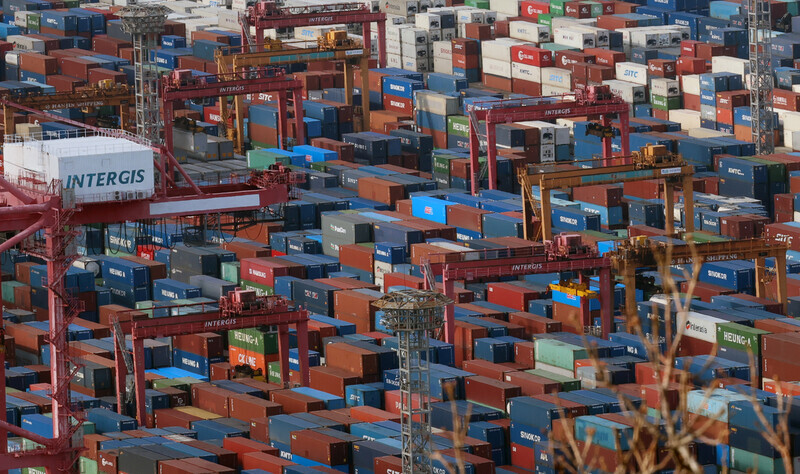hankyoreh
Links to other country sites 다른 나라 사이트 링크
Emphasis on fiscal soundness limits S. Korea’s growth to 1.4% in 2023

The South Korean economy only posted 1.4% growth in 2023, falling below its potential growth rate of about 2.0%. Combined with a slowdown in consumption and exports, the current administration’s emphasis on fiscal soundness (in other words, tight fiscal policy) has led to unusually low growth.
According to a report on real GDP in the fourth quarter of 2023 and for the whole year that was published by the Bank of Korea on Thursday, Korea’s real GDP for 2023 increased by 1.4% compared to the previous year. This is the first time since 2000 that Korea’s economic growth has fallen below 2% except for 2020 (-0.7%), during the pandemic, and 2009 (0.8%), during the global financial crisis.
Korea’s consumption and exports were especially sluggish. Private-sector consumption only grew by 1.8% (year over year), the lowest it has been in three years, since 2020 (-4.8%). Spending was suppressed by high prices and high interest rates and flagged because of a tapering in the “revenge spending” that had roared back after COVID-19 restrictions were lifted.
Exports only grew by 2.8%, the lowest rate in three years, because of a weak IT sector.
Government spending wasn’t enough to prime the pump during a downtown in the real economy. In short, fiscal expenditure was weak because of the current administration’s emphasis on fiscal soundness. Government spending only increased by 1.3%, the lowest rate of increase in 23 years, since 2000 (0.7%).
The economic growth rate was lower than the potential growth rate, which was estimated to be 2.0%. That means the economy didn’t grow as much as it could have.
“The government’s tight fiscal policy amid poor economic conditions caused low growth in the 1% range. When economic growth underperforms potential growth, that means the government needs to totally rethink its policy approach,” said Ryu Deock-hyun, a professor of economics at Chung-Ang University.
By Jun Seul-gi, staff reporter
Please direct questions or comments to [english@hani.co.kr]

Editorial・opinion
![[Guest essay] Preventing Korean Peninsula from becoming front line of new cold war [Guest essay] Preventing Korean Peninsula from becoming front line of new cold war](https://flexible.img.hani.co.kr/flexible/normal/500/300/imgdb/original/2024/0507/7217150679227807.jpg) [Guest essay] Preventing Korean Peninsula from becoming front line of new cold war
[Guest essay] Preventing Korean Peninsula from becoming front line of new cold war![[Column] The state is back — but is it in business? [Column] The state is back — but is it in business?](https://flexible.img.hani.co.kr/flexible/normal/500/300/imgdb/original/2024/0506/8217149564092725.jpg) [Column] The state is back — but is it in business?
[Column] The state is back — but is it in business?- [Column] Life on our Trisolaris
- [Editorial] Penalties for airing allegations against Korea’s first lady endanger free press
- [Editorial] Yoon must halt procurement of SM-3 interceptor missiles
- [Guest essay] Maybe Korea’s rapid population decline is an opportunity, not a crisis
- [Column] Can Yoon steer diplomacy with Russia, China back on track?
- [Column] Season 2 of special prosecutor probe may be coming to Korea soon
- [Column] Park Geun-hye déjà vu in Yoon Suk-yeol
- [Editorial] New weight of N. Korea’s nuclear threats makes dialogue all the more urgent
Most viewed articles
- 1Behind-the-times gender change regulations leave trans Koreans in the lurch
- 2Yoon’s revival of civil affairs senior secretary criticized as shield against judicial scrutiny
- 3Family that exposed military cover-up of loved one’s death reflect on Marine’s death
- 4Japan says its directives were aimed at increasing Line’s security, not pushing Naver buyout
- 5Unexpected rate of AI development requires timely discussion of side effects
- 6[Guest essay] Preventing Korean Peninsula from becoming front line of new cold war
- 7A breath of fresh air: Innovative architecture in the time of COVID-19
- 8S. Korean first lady likely to face questioning by prosecutors over Dior handbag scandal
- 9Marines who survived flood that killed colleague urge president to OK special counsel probe
- 10Is Japan about to snatch control of Line messenger from Korea’s Naver?